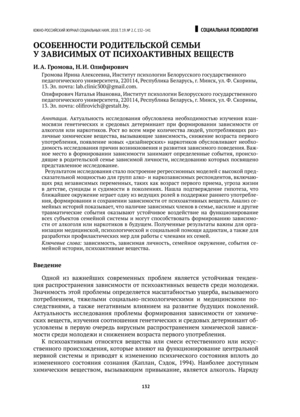Аннотация
Актуальность исследования обусловлена необходимостью изучения взаимосвязи генетических и средовых детерминант при формировании зависимости от алкоголя или наркотиков. Рост во всем мире количества людей, употребляющих различные химические вещества, вызывающие зависимость, снижение возраста первого употребления, появление новых «дизайнерских» наркотиков обусловливают необходимость исследования причин возникновения и развития зависимого поведения. Важное место в формировании зависимости занимают определенные события, происходящие в родительской семье зависимой личности, исследованию которых посвящено представленное исследование. Результатом исследования стало построение регрессионных моделей с высокой предсказательной мощностью для групп алко- и наркозависимых респондентов, включающих ряд независимых переменных, таких как возраст первого приема, угроза жизни в детстве, суициды и судимости в поколениях. Нашла подтверждение гипотеза, что ближайшее окружение играет одну из ведущих ролей в поддержке раннего употребления, формировании и сохранении зависимости от психоактивных веществ. Анализ семейных историй показывает, что наличие зависимых членов в семье, насилие и другие травматические события оказывают устойчивое воздействие на функционирование всех субъектов семейной системы и могут способствовать формированию зависимости от алкоголя или наркотиков в будущем. Полученные результаты важны для организации медицинской, психологической и социальной помощи аддиктам, а также для разработки профилактических мер для работы с членами их семей.
Ключевые слова
Библиографические ссылки
Beytson, G. (2000). Ekologiya razuma: Izbrannyye stati po antropologii. psikhiatrii i epistemologii [Ecology of the mind: Selected articles on anthropology, psychiatry and epistemology]. Moskva: Smysl.
Boyle, M. H. (2001). Familial influences on substance misuse by adolescents and young adults. Canadian J. of Public Health, 92 (3), 206–209.
Brunswick, A. F. (1986). Drugs, lifestyle, and health: a longitudinal study of urban black youth. Am. J. Public Health, 76 (1), 52–57.
Chernikov, A. V. (1998). Genogramma i kategorii analiza semeynoy istorii [Genogram and categories of analysis of family history]. Psikhologicheskoe. Konsultirovanie [Psychological Counseling], 1, 109–125.
Choquet, M. (2008). Perceived parenting styles and tobacco, alcohol and cannabis use among french adolescents: gender and family structure differentials. Alcohol and Alcoholism, 43 (1), 73–80.
Deschenes, E. P. (1991). Narcotics addiction: related criminal careers, social and economic costs. J. of Drug Issues, 21 (2), 383–411.
Drugs and vulnerable groups of young people EMCDDA. (2008, June). Retrieved from http://www.emcdda.europa.eu/ publications/selected-issues/vulnerable-young
Engel, G. L. (1980). The clinical application of the biopsychosocial model. The American J. of Psychiatry, 137 (5), 535–544.
Eydemiller, E. G. & Yustitskis, V. V. (2008). Psikhologiya i psikhoterapiya semi [Psychology and psychotherapy of the family]. 4-e izd. St. Petersburg: Piter.
Gibson, J. M. (1993). Use of Bowen Theory. J. of Additions and Offender Counseling, 14 (1), 25–35.
Gromova, I. A. (2017). Determinanty zavisimykh i sozavisimykh otnosheniy: monografiy [Determinants of dependent and co-dependent relations: monograph]. Minsk: Belarusian State University.
Jacobs, G. A. (1988). Personality and smokeless tobacco use. Addictive Behaviors, 13 (13), 311–318.
Jiloha, R. C. (2009). Social and Cultural Aspects of Drug Abuse in Adolescents. Delhi Psychiatry J., 12 (2), 167–175.
Kaplan, G. I. & Sedok. B. Dzh. (1994). Klinicheskaya psikhiatriya: V 2 t. T. 1. [Clinical psychiatry: In 2 t. T. 1.]. Moscow.
Kopytov, A. V. (2012). Alkogolnaya zavisimost u podrostkov i molodykh lyudey muzhskogo pola (sotsialno-psikhologicheskiye aspekty): monografiya [Alcohol dependence in adolescents and young men of the male (socio-psychological aspects: monograph]. Minsk: Belarusian State University.
Krai, A. H. (1998). HIV seroprevalence among street-recruited injection drug and crack cocaine users in 16 US municipalities. Am. J. Public Health, 88 (1), 108–113.
McArdle, P. (2002). European adolescent substance use: the roles of family structure, function and gender. Addiction, 97 (3), 329–336.
Nikolskaya, I. M. (2010). Klinicheskaya psikhologiya semi: osnovnyye polozheniya [Clinical psychology of the family: basic provisions]. Meditsinskaya psikhologiya v Rossii: elektron. nauch. zhurn., 4. [Medical psychology in Russia: electron. sc. m.] Retrieved from http://www.medpsy.ru/mprj/archiv_global/2010_4_5/nomer/nomer13.php
Olifirovich, N. I. & Velenta, T. F. (2017). Teoriya semeynoy psikhoterapii: sistemno-analiticheskiy podkhod [Theory of family psychotherapy: the system-analytic approach]. Moskva: Akademicheskiy Proyekt [Moscow: Academic Project].
Beyker, K., Varga, A. Ya. (eds.) (2005). Teoriya semeynykh sistem Myurreya Bouena: osnovnyye ponyatiya. metody i klinicheskaya praktika [The theory of family systems of Murray Bowen: basic concepts, methods and clinical practice]. Moskva: Kogito-Tsentr [Moscow: Kogito-Tsentr].
Tomson, P. V. (1985). Genograms in general practice. J. of the Royal Society of Medicine Supplement, 78 (8), 34–39.
Varga, A. Ya. (2000). Sistemnaya semeynaya psikhoterapiya [Systemic family psychotherapy]. V Osnovnyye napravleniya sovremennoy psikhoterapii [The main directions of modern psychotherapy] (s. 180–224). Moskva: Kogito-Tsentr [Moscow: Kogito-Tsentr].

